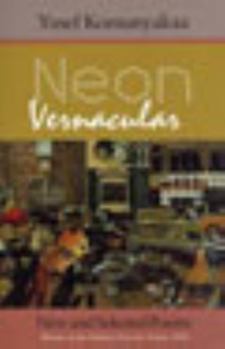Neon Vernacular: New and Selected Poems
Select Format
Select Condition 
Book Overview
An award-winning poet's testimony of the war in Vietnam.
Format:Paperback
Language:English
ISBN:0819512117
ISBN13:9780819512116
Release Date:March 1993
Publisher:Wesleyan University Press
Length:188 Pages
Weight:0.65 lbs.
Dimensions:0.6" x 5.5" x 8.5"
Age Range:18 years and up
Customer Reviews
5 ratings
"Like a man drunk on the rage / Of being alive"
Published by Thriftbooks.com User , 18 years ago
Some people read Komunyakaa because he's a great Vietnam war poet. Some read him because he's a truly great Black poet. And they're right, too. And there's that unmistakable southern voice. And the omnipresent realization that nothing on this earth is ordinary and unworthy of praise, and brutal honesty is the poet's greatest strength. But the reason everyone should read Komunyakaa is that he is one of the greatest, clearest voices of our age. Here is the confirmation of your own humanity that every reader seeks.
Highly Recommended!!!
Published by Thriftbooks.com User , 21 years ago
This is a tremendous collection of Komunyakaa's life work, and is highly recommended for anyone who loves poetry and is looking for a new author to light up your imagination. I had to laugh at the reviewer from Minneapolis; he instead recommends Anthony Hecht, John Hollander and Albert Goldbarth -- the three most boring poets in the English language! If you want to be bored out of your skull, take this guy's recommendations. If you want to see how amazing contemporary poetry can be, I can't recommend this book highly enough.
LANGUAGE LIT UP: SOUL-TO-SOUL COMMUNICATION
Published by Thriftbooks.com User , 23 years ago
After I saw the movie "Il Postino" ("The Postman"), I was so moved and intrigued I had to go check out the poetry of Pablo Neruda. And after I heard Yusef Komunyakaa read from his own work, I immediately had to buy this collection of his poetry, NEON VERNACULAR, a book I have singularly cherished ever since.Long ago, a friend defined poetry for me as "the marriage of meaning and music." I remember the late Etheridge Knight bemoaning in one of his haiku poems that "making words swing . . . ain't no square poet's job." Over the years, I've heard a number of poets read poetry, mostly their own; only a handful, such as Amiri Baraka, with any kind of groove and insight.Komunyakaa and his work were both unknown quantities when I heard him read at Boston University some years ago. Never forget it! His voice was resonant as a cello. His presence was serene, eloquent as burnished mahogany. His casual elegance reminded me of singer "Big Joe" Williams, who fronted Count Basie's band for so many years. Combine that majesty with the power and grace of his reading, the pulse and insight of his poems . . . He finished to a standing ovation, while I, practically doubled over and in tears, as if just kicked in the solar plexus (literally knocked out by the beauty and the passion of what I'd just witnessed) cried in awe and joy. His performance had touched me, as someone else I knew once said, "down here where the soul begins . . ."What about his poetry moves me so much? His wordsmithing in a distinct blues & jazz-inflected voice. The visceral impact as he explores growing up in the segregated South, his relationship to his father and family and friends; the terror and inhumanity of war; the examination of human frailty and pain and the struggle to decipher and determine a place in this world. I love his sheer virtuosity in sculpting language and rending fresh, startling images: "The tongue labors,/ a victrola in the mad mouth-hole/ of 3 A.M. sorrow." "When days are strung together,/ the hourglass fills/ with worm's dirt." Or perhaps the summation of loneliness (the ultimate human condition) in my favorite of his poems, "The Heart's Graveyard Shift": "Between loves I could stand all day/ at a window watching honeysuckle open/ as I make love to the ghosts/ smuggled inside my head."This is word music that thrills you . . .
One of my favorite books
Published by Thriftbooks.com User , 23 years ago
While I can't agree with the clinical nature of the previous review, I do agree that this book is truly great. However, I would not put Komunyakaa on my list of best African-American Poets, he is simply one of the best poets writing today. As good as Frank Stanford ever was. Truth be told I am wondering when it will be his turn to be names U.S. Poet Laureate. I fully expect him to receive the Nobel Prize.Now about the book: I have been actively searching out Komunyakaa ever since I saw his poem, "Troubling the Waters." When I bought Neon Vernacular some years ago I put everything else away because Neon Vernacular was the only thing worth looking at for months. Now, I find myself reading "Songs for My Father" over and over. I even wroe a poem based upon "Starlight Scope Myopia" from Dien Cai Dau. Simply put, Yusef Komunyakaa is the one living writer I most want to meet with and talk poetry.
Unadorned and Unafraid
Published by Thriftbooks.com User , 24 years ago
This Pulitzer Prize winning collection of poetry is a document to the power diversity of the best African-American poet to come along in the post-modern (after WWII) period. Komunyakaa, who appeared this past fall as part of the Lenoir-Rhyne College Writers Series, is at his best when writing about jazz, his relationships with other family members and his Vietnam experience. The passages are often chilling and direct, unadorned yet filled with perfect word choices.





